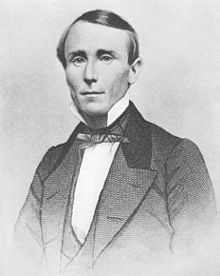William Walker (filibuster)
| William Walker | |
|---|---|
 |
|
| President of the Republic of Nicaragua | |
|
In office July 12, 1856 – May 1, 1857 |
|
| Preceded by | Patricio Rivas |
| Succeeded by | Máximo Jerez and Tomás Martínez |
| 1st President of the Republic of Sonora | |
|
In office January 21, 1854 – May 8, 1854 |
|
| 1st President of the Republic of Lower California | |
|
In office November 3, 1853 – January 21, 1854 |
|
| Personal details | |
| Born |
May 8, 1824 Nashville, Tennessee |
| Died |
September 12, 1860 (aged 36) Trujillo, Honduras |
| Political party | Democratic (Nicaragua) |
| Signature | |
William Walker (May 8, 1824 – September 12, 1860) was an American physician, lawyer, journalist and mercenary who organized several private military expeditions into Latin America, with the intention of establishing English-speaking colonies under his personal control, an enterprise then known as "filibustering." Walker usurped the presidency of the Republic of Nicaragua in 1856 and ruled until 1857, when he was defeated by a coalition of Central American armies. He was executed by the government of Honduras in 1860.
Walker was born in Nashville, Tennessee, in 1824 to James Walker and his wife Mary Norvell. His father was a son of a Scottish immigrant. His mother was a daughter of Lipscomb Norvell, an American Revolutionary War officer from Virginia. One of Walker's maternal uncles was John Norvell, a US Senator from Michigan and founder of The Philadelphia Inquirer. William Walker was engaged to Helen Martin, but they never married, and he died without any children.
William Walker graduated summa cum laude from the University of Nashville at the age of fourteen. He studied medicine at the University of Edinburgh and University of Heidelberg before receiving his medical degree from the University of Pennsylvania at the age of 19. He practiced briefly in Philadelphia before moving to New Orleans to study law.
...
Wikipedia
